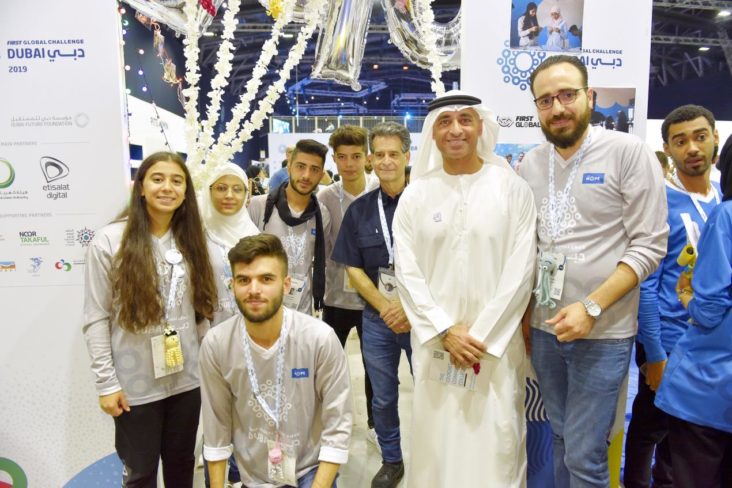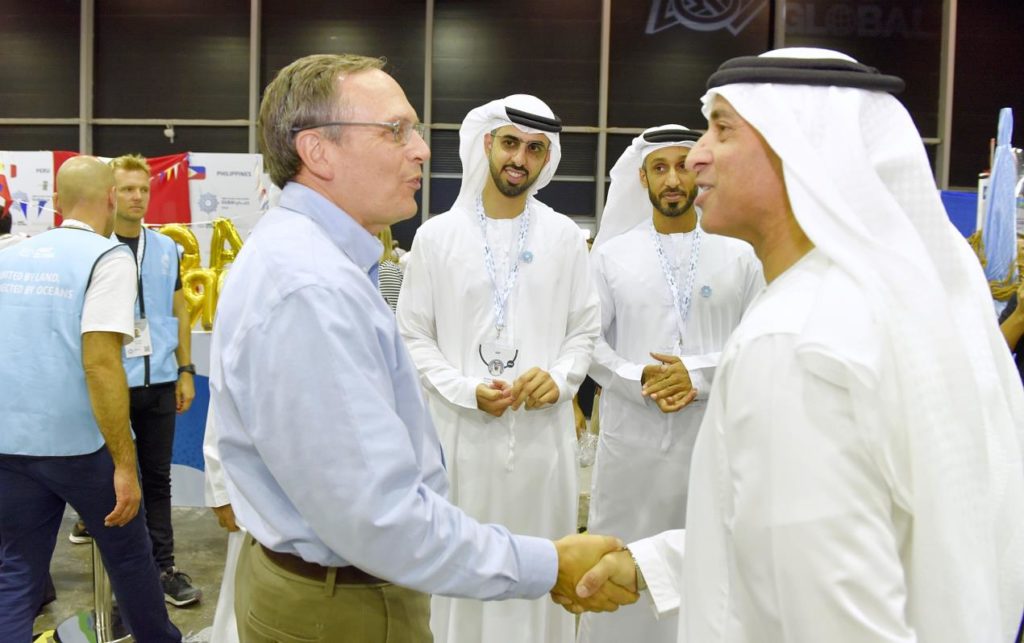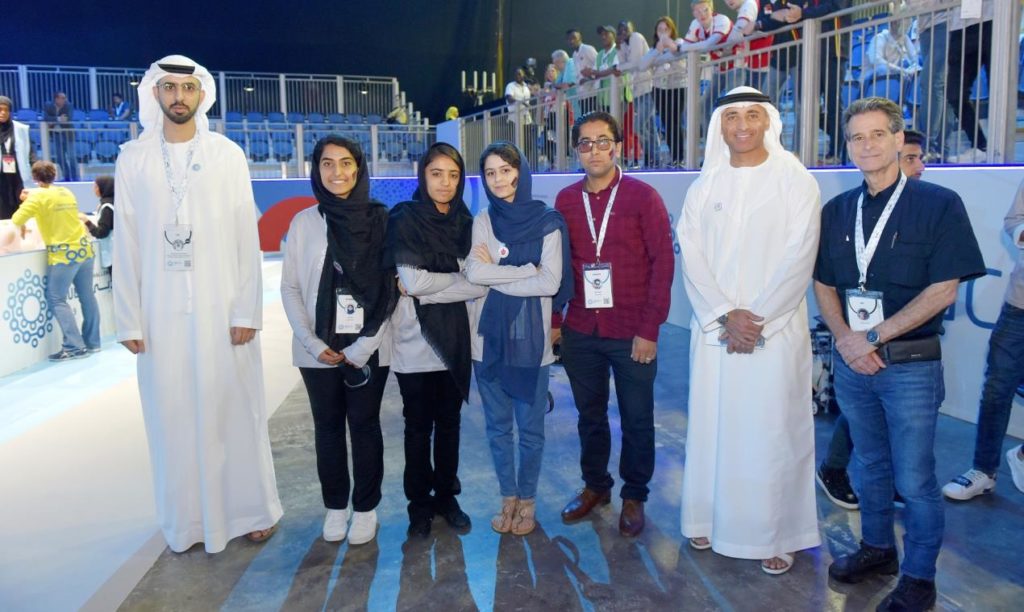FIRST Global Challenge Kicks Off In Dubai With 1,500 Students Representing 191 Countries

The FIRST Global Challenge 2019 in Dubai, the third edition of the annual international robotics competition, kicked off at Festival Arena today with the participation of more than 1,500 contestants from 191 countries. This year’s theme – “Ocean Opportunities” – focuses on creating robots to clean up the oceans through eliminating waste and pollutants.
A number of senior officials and executives attended the first day of the competition with local and international media covering the event that is taking place outside the Americas for the first time after the United States and Mexico hosted the first two editions. The choice of Dubai as the host of this year’s competition reaffirms its global leadership status in the empowerment of youth through the development of technology and innovation, and aligns with the values of the UAE’s Year of Tolerance.
His Excellency Omar Sultan Al Olama, Minister of State for Artificial Intelligence and Deputy Managing Director of Dubai Future Foundation (DFF) stressed the importance of hosting this event as part of the UAE’s journey in shaping the future and keeping pace with the rapid technological developments driven by the Fourth Industrial Revolution (4IR) across the board.
His Excellency Omar Sultan Al Olama said: “Robotics is one of the most important fields of scientific competition among the world’s largest economies. The UAE’s interest in this vital domain stems from the economic and scientific opportunities associated with robots in diverse areas of life, in addition to the country’s keenness to contribute to finding solutions to anticipated challenges that may face the world in the future.”
He added: “Hosting this international event reflects the UAE’s belief in the importance of accelerating the pace of the Fourth Industrial Revolution, and empowering young people in our country, the wider region and the rest of the world to shape the future. The high level of commitment we saw from the participants on day one of the competition gives us confidence for a better tomorrow, where those bright minds and hearts will lead the way.”
Dean Kamen, Founder of the FIRST Global, said: “It’s not hard to see why Dubai has made this event such a spectacular success. I like to think of Dubai as the poster child for the hosting of high-tech events and the development of emerging technologies. You know you’re at the center of the world here, and there’s a real drive and ambition to turn this place into a global hub for innovation led by youth.”
His Excellency Khalfan Belhoul, CEO of Dubai Future Foundation (DFF), said: “The UAE has become a global laboratory for ideas owing to its visionary strategies and its ongoing efforts to spearhead the Fourth Industrial Revolution. Through this global event that coincides with the Year of Tolerance, we seek to not only fast-track scientific advancements, but also bring together people of the world to save our earth, the planet we have the responsibility to preserve. What may seem like a competition is, in essence, a giant collaborative effort to address the challenge of ocean pollution – it’s our acknowledge of the hard work of thousands of young people who spend their time to find solutions to save the world in which they will grow up with their children. The competition embodies the concept of competitive cooperation towards a noble goal. This is the mindset we need in order to save our environment for the future generations.”
The competition venue features six competition areas, each with six teams competing. Three teams form an alliance against the other three. The goal is to score the maximum number of points during the qualifying days, after which the teams with the highest scores will proceed to the finals based on a rankings system, set to take place on Sunday, October 27, followed by the announcement of the winners and an award ceremony to conclude the tournament.
The purpose-built venue includes team areas, training spaces, two playgrounds and a space for assembling and preparing robots before the competition. One of its most important parts is the Robotics Clinic that enables teams to perform any repairs that may be required, and is staffed by Emirati volunteers as well as participants from abroad.
The qualifying rounds focus on the capability of the robots to perform a set of tasks that support the global efforts to protect and clean the oceans from the millions of tons of pollutants that negatively affect marine life and the health of the global population.
On day one of the competition, 141 of the total 284 qualifying-round matches were played. In the early exchanges, Team UAE claimed an impressive three wins from three matches, while Team China has taken an early lead in the overall ranking points.
The results from the early stage heats all contribute to the final ranking of each country. Final rankings will be confirmed towards the end of day two once all the qualifying matches have been completed. Once the qualifying rounds have been played, the top 32 ranked teams then go on to face each other in a series of play-offs, before a winner is crowned in a final that pits the top 8 teams against each other on day 3, Sunday 27 October.
Even though technology is the dominant theme of the challenge, the human side is also in evidence, whether through the help the teams offer to one another or through showcasing the cultures of each participating country. For instance, the teams presented their national flags as gifts to their rivals.
Reflecting the spirit of tolerance that is prevalent in the UAE as well as the competition, and despite the many moments of intense competition, the competition brought together a vast array of cultures and nationalities with one goal: to contribute towards the clean-up of the world’s oceans and develop crucial skills that will see youth power future progress. The UAE is an ideal place for this exchange of experiences.
A can-do spirit
While other teams worked for months to program, design and build their robots and learn to operate them, Team Bahrain needed only 10 hours to assemble their robot. Although they were the last to register for the event, and it is their first time to participate, the Bahraini students rose to the challenge and succeeded in assembling a robot based on their experience in previous robotics competitions. This was a prime example of the can-do spirit that was very much in evidence at the tournament.
UAE’s prominent status
The FIRST Global Challenge 2019 in Dubai consolidates the UAE’s prominent status as a preferred host of global events and testifies to its pivotal role in international endeavors to leverage future technologies to build the capacities of young people and motivate them to create innovative solutions to the world’s challenges in vital sectors.
The teams featured in the competition were selected based on their results in a year-round series of qualifying events held around the world. Every year, each team receives a robotic kit and is tasked with assembling a robot that can address various issues identified by specialized international academic institutions.
Team UAE
Team UAE comprises seven high school students: Shouq Saeed Al Dhanhani and Sheikha Ali Al Soreidi from Dibba Al Fujairah Secondary School, and Hamad Saeed, Abdullah Jawdat, Abdul Rahman Abdullah, Ghazi Salem and Mohammed Yasser from Rashid bin Saeed Secondary School in Hatta.
Inaugurated by His Highness Sheikh Hamdan bin Mohammed bin Rashid Al Maktoum, Crown Prince of Dubai and Chairman of The Executive Council of Dubai, and organized by the Dubai Future Foundation, the FIRST Global Challenge 2019 in Dubai has drawn the participation of 1,500 students aged 14-18 from 191 countries. From October 24 to 27, 2019, the teams are competing in leveraging robotics and artificial intelligence applications to develop innovative solutions to the world’s challenges. This year’s edition of the international challenge focuses on protecting the oceans.




